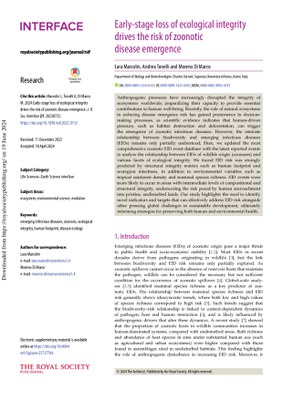Early-stage Loss of Ecological Integrity Drives the Risk of Zoonotic Disease Emergence
This study updated the most comprehensive zoonotic emerging infectious diseases (EID) event database with the latest reported events to analyze the relationship between EIDs of wildlife origin (zoonoses) and various facets of ecological integrity.
https://biodiversitylinks.org/learning-evidence/one-health-evidence/one-health-evidence-inbox/early-loss-of-ecological-integrity-drives-risk-of-zoonotic-disease-emergence.pdf/view
https://biodiversitylinks.org/learning-evidence/one-health-evidence/one-health-evidence-inbox/early-loss-of-ecological-integrity-drives-risk-of-zoonotic-disease-emergence.pdf/@@download/image/image.jpg
File
Early-stage Loss of Ecological Integrity Drives the Risk of Zoonotic Disease Emergence
Author(s):
Lara Marcolin, Andrea Tonelli, and Moreno Di Marco
Publication Date: 2024
DOWNLOAD FILE
This study updated the most comprehensive zoonotic emerging infectious diseases (EID) event database with the latest reported events to analyze the relationship between EIDs of wildlife origin (zoonoses) and various facets of ecological integrity.
We found EID risk was strongly predicted by structural integrity metrics such as human footprint and ecoregion intactness, in addition to environmental variables such as tropical rainforest density and mammal species richness. EID events were more likely to occur in areas with intermediate levels of compositional and structural integrity, underscoring the risk posed by human encroachment into pristine, undisturbed lands.



